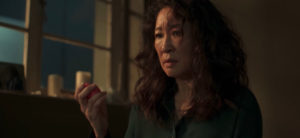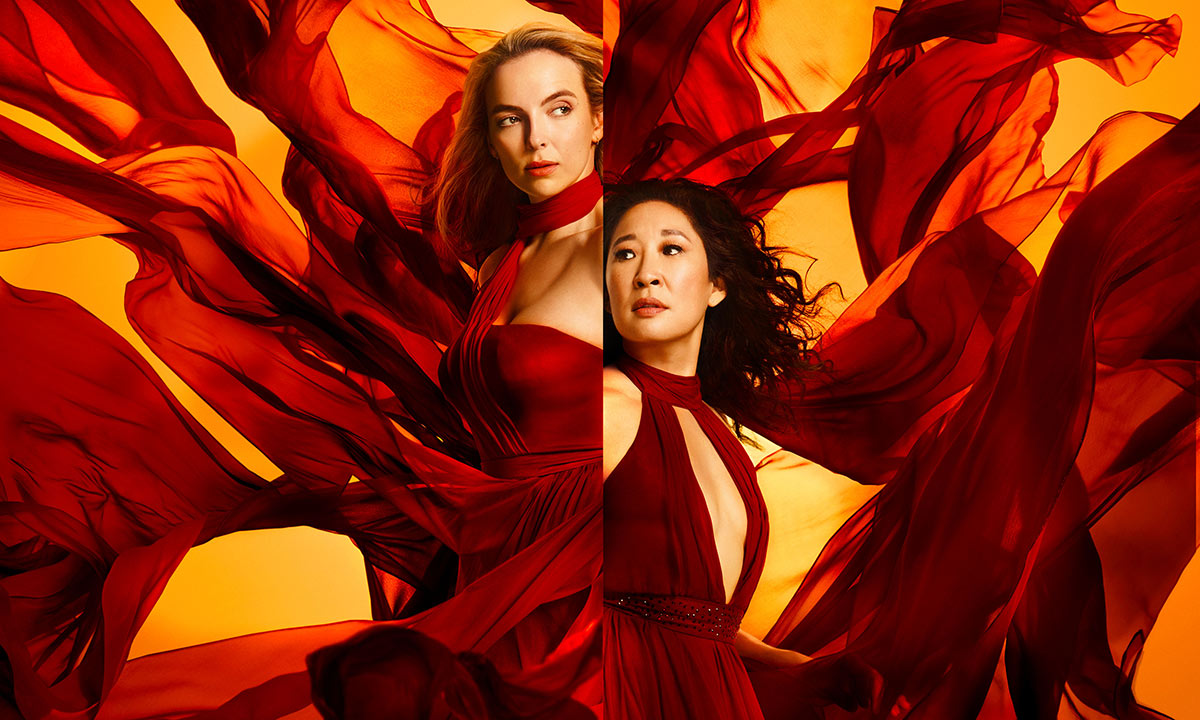Killing Eve’s third season came to a close last week and the latest eight episodes have split opinion quite dramatically. While the show is nowhere near the quality of its first, Phoebe Waller-Bridge written season, I found the third season to be a big step up from the second. Problems still remain, and new ones have been birthed, but the latest season was a largely fun and engaging black comedy continuing the adventures of assassin Villanelle and Eve, the ex-MI6 agent obsessed with finding her. The third season seemed to learn from the second by fixing what was the series’ biggest misstep: having Eve and Villanelle be together.
 I know this is what an awful lot of fans of the series want from the show, and were even annoyed at the third season for not continuing, but my issue is not with the characters being in a twisted relationship or obsessed with each other, but simply them being in many scenes together. The second season almost torpedoed the entire series for me by eliminating the cat-and-mouse game and making Eve and Villanelle work together. Suddenly they were almost colleagues, spending vast amounts of time together. The tension of the show lies with these two characters and how they’ll react to each other, something that is greatly diminished as their relationship is normalised and they become used to each other’s presence. The audience should see every second they are in each other’s company because every second something dramatic, either a kiss or a kill, could happen, but by the end of the season they were taking long car journeys together that we weren’t privy to. Suddenly all the tension and drama were lost.
I know this is what an awful lot of fans of the series want from the show, and were even annoyed at the third season for not continuing, but my issue is not with the characters being in a twisted relationship or obsessed with each other, but simply them being in many scenes together. The second season almost torpedoed the entire series for me by eliminating the cat-and-mouse game and making Eve and Villanelle work together. Suddenly they were almost colleagues, spending vast amounts of time together. The tension of the show lies with these two characters and how they’ll react to each other, something that is greatly diminished as their relationship is normalised and they become used to each other’s presence. The audience should see every second they are in each other’s company because every second something dramatic, either a kiss or a kill, could happen, but by the end of the season they were taking long car journeys together that we weren’t privy to. Suddenly all the tension and drama were lost.
I’m delighted then that Killing Eve’s third season fixed this disastrous misstep and the slow, reboot nature of the opening episodes saved the series. After the dramatic events of the second season finale, Eve and Villanelle were over each other – or so they claimed. Happily, they were separated, following their own storylines that threatened to cross. The series is filled with quirky and entertaining side characters that can push the plot forward without Eve or Villanelle meeting every episode. As the third season proved, the show should be a series of encounters between them, each of them brief but potent, having an impact long after they part ways. For example, the scene on the bus when Eve looks up and suddenly Villanelle is walking towards her is shocking and brilliant in its execution because of its pithiness and the fact that the preceding and following episodes have them separated. It’s not until the finale, five episodes later, when they meet again face-to-face allowing all the tension, of multiple sorts, to build once more.
 Now, while the third season corrected the second’s glaring flaw, it did also have some problems of its own. The separation of Eve and Villanelle worked overall but Sandra Oh’s Eve was given the much weaker material. She became a supporting character in her own show and her investigation into The Twelve and Kenny’s death was slow and a little dull at times. The darkness awakening inside her was inevitable and I feel they could have developed that aspect more consistently. I did enjoy the move away from MI6 however and the introduction of Bitter Pill and its investigators, plus Fiona Shaw as Carolyn maybe had her best season as her cold exterior began to crack. But we didn’t receive an answer to the biggest mystery of the show: why did Kenny have a photo of himself as his phone background?!
Now, while the third season corrected the second’s glaring flaw, it did also have some problems of its own. The separation of Eve and Villanelle worked overall but Sandra Oh’s Eve was given the much weaker material. She became a supporting character in her own show and her investigation into The Twelve and Kenny’s death was slow and a little dull at times. The darkness awakening inside her was inevitable and I feel they could have developed that aspect more consistently. I did enjoy the move away from MI6 however and the introduction of Bitter Pill and its investigators, plus Fiona Shaw as Carolyn maybe had her best season as her cold exterior began to crack. But we didn’t receive an answer to the biggest mystery of the show: why did Kenny have a photo of himself as his phone background?!
For better or worse, Killing Eve is now ‘The Villanelle Show’. Jodie Comer is as brilliant as always, and while the series still occasionally slipped into self-indulgent mode by dressing Villanelle in crazy costumes and watching her walk around exotic locations without much purpose (which is still enjoyable to watch), the season ultimately tried to expose hidden depths and truths about the character. And it mostly succeeded. Villanelle’s development was a little messy and oddly paced but I loved seeing her flounder after Eve’s rejection last season. She begins the season married but it doesn’t work out. She seeks a higher status in The Twelve but “management sucks” and it doesn’t work out. She finds her long lost family and that definitely doesn’t work out – with that Eve-less entry being the standout of the season. She chooses to run away with Konstantin but, yep, that doesn’t work out either. She even loses her ability to kill, and it’s ambiguous to whether – after being aided by a train – she’s regained it by the season’s end. Her flip flopping and inconsistency is all intentional because it’s Eve she truly wants, something they both realise on Tower Bridge in the season’s closing scene.
 The ending implies that Eve and Villanelle will be spending a lot more time together in season 4. They’ve professed their feelings and chosen each other, so does this undo all the third season’s hard work keeping them apart and reimbuing the twisted relationship with drama and tension? That remains to be seen but if they have indeed run off together then I hope the writers manage their relationship much better than in the second season. Or just because they chose not to exit each other’s lives doesn’t mean they’ll be together. Villanelle could return to The Twelve and Eve to Bitter Pill or MI6 with a plan of their own, staying in contact and meeting but with storylines and locations of their own. I’m looking forward to the fourth season, even though it’s with some tentativeness. But as long as Konstantin is still around laughing at people then the show won’t be a total bust.
The ending implies that Eve and Villanelle will be spending a lot more time together in season 4. They’ve professed their feelings and chosen each other, so does this undo all the third season’s hard work keeping them apart and reimbuing the twisted relationship with drama and tension? That remains to be seen but if they have indeed run off together then I hope the writers manage their relationship much better than in the second season. Or just because they chose not to exit each other’s lives doesn’t mean they’ll be together. Villanelle could return to The Twelve and Eve to Bitter Pill or MI6 with a plan of their own, staying in contact and meeting but with storylines and locations of their own. I’m looking forward to the fourth season, even though it’s with some tentativeness. But as long as Konstantin is still around laughing at people then the show won’t be a total bust.
Did you prefer the second or third season of Killing Eve? What are your predictions for the next season? Let me know in the comments and be sure to geek out with me about TV, movies and video-games on Twitter @kylebrrtt.








